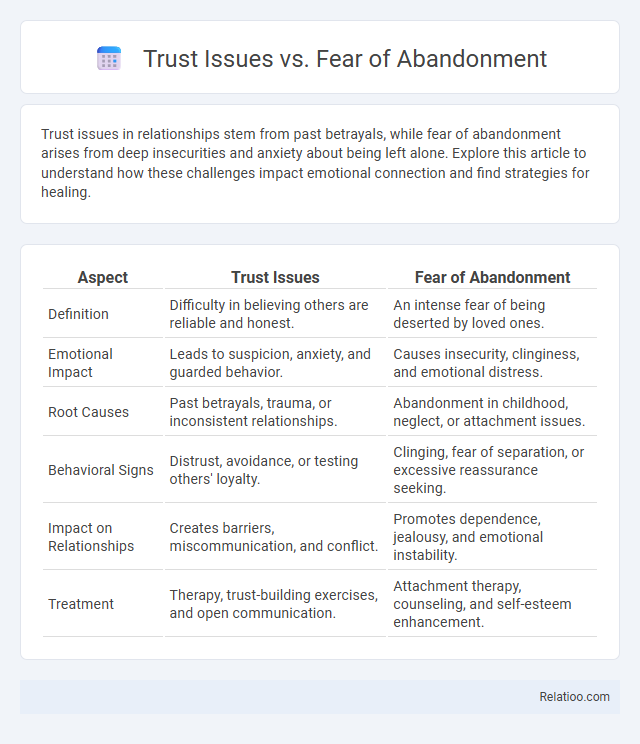Trust issues in relationships stem from past betrayals, while fear of abandonment arises from deep insecurities and anxiety about being left alone. Explore this article to understand how these challenges impact emotional connection and find strategies for healing.
Table of Comparison
| Aspect | Trust Issues | Fear of Abandonment |
|---|---|---|
| Definition | Difficulty in believing others are reliable and honest. | An intense fear of being deserted by loved ones. |
| Emotional Impact | Leads to suspicion, anxiety, and guarded behavior. | Causes insecurity, clinginess, and emotional distress. |
| Root Causes | Past betrayals, trauma, or inconsistent relationships. | Abandonment in childhood, neglect, or attachment issues. |
| Behavioral Signs | Distrust, avoidance, or testing others' loyalty. | Clinging, fear of separation, or excessive reassurance seeking. |
| Impact on Relationships | Creates barriers, miscommunication, and conflict. | Promotes dependence, jealousy, and emotional instability. |
| Treatment | Therapy, trust-building exercises, and open communication. | Attachment therapy, counseling, and self-esteem enhancement. |
Understanding Trust Issues: Definition and Causes
Trust issues stem from deep emotional wounds often linked to past betrayals or inconsistent relationships, causing difficulty in relying on others. Fear of abandonment is a specific anxiety related to the anticipation of being left or rejected, frequently rooted in early attachment experiences. Understanding your trust issues involves recognizing these underlying causes to foster healthier connections and emotional resilience.
What is Fear of Abandonment? Key Traits and Origins
Fear of abandonment is a deep emotional concern rooted in the anticipation of being left alone or rejected, often stemming from early childhood experiences such as inconsistent caregiving or trauma. Key traits include anxiety over relationships, excessive need for reassurance, and difficulty trusting others, which can lead to clinginess or withdrawal. This fear differs from general trust issues, which primarily involve skepticism about others' reliability, and from actual abandonment, which is the experience of being left behind or neglected.
Trust Issues vs Fear of Abandonment: Core Differences
Trust issues stem from difficulty believing in others' reliability or intentions, often rooted in past betrayals or emotional hurt. Fear of abandonment centers on anxiety about being deserted or rejected, driving intense clinginess or withdrawal to avoid separation. While trust issues affect the ability to rely on others, fear of abandonment triggers emotional responses to perceived threats of loss or loneliness.
How Childhood Experiences Shape Attachment Styles
Childhood experiences play a critical role in shaping attachment styles, influencing how individuals develop trust issues, fear of abandonment, or actual abandonment patterns. Insecure attachments formed from inconsistent or neglectful caregiving often lead to heightened anxiety about trust and fears of being abandoned in adulthood. These early relational dynamics establish internal working models that affect emotional regulation, interpersonal relationships, and vulnerability to abandonment-related trauma.
Signs You Have Trust Issues in Relationships
Signs you have trust issues in relationships include constant doubt about your partner's intentions, difficulty believing their honesty, and frequent jealousy without clear reasons. You may feel anxious when your partner spends time away or communicates less, leading to overanalyzing their behavior. These trust issues often stem from past abandonment trauma or fear of being left, impacting your ability to form secure connections.
Recognizing Fear of Abandonment in Daily Life
Recognizing fear of abandonment in daily life involves noticing persistent anxiety about losing loved ones, heightened sensitivity to rejection, and clingy or avoidant behaviors in relationships. Unlike general trust issues, which may stem from past betrayals or dishonesty, fear of abandonment specifically triggers feelings of insecurity tied to being left alone or unloved. Understanding these emotional patterns helps differentiate abandonment fears from actual experiences of abandonment, allowing for targeted emotional support and therapeutic strategies.
Emotional Triggers: Trust Issues vs Abandonment Fears
Emotional triggers play a crucial role in distinguishing trust issues from fear of abandonment and abandonment itself. Trust issues often stem from past betrayals or broken promises, causing Your reactions to situations that remind You of those breaches, while fear of abandonment centers on the anxiety of being left alone or unsupported, triggered by perceived signs of neglect or emotional distance. Abandonment involves actual loss or separation, intensifying emotional distress and reinforcing both trust issues and abandonment fears through direct experiences of rejection.
The Impact on Romantic Relationships
Trust issues rooted in past betrayals often lead to constant doubt and insecurity, undermining Your ability to connect deeply with a partner. Fear of abandonment triggers clinginess or emotional withdrawal, creating a cycle of tension that damages intimacy and communication. Actual abandonment leaves lasting emotional scars, influencing future relationship dynamics by increasing anxiety and reducing confidence in sustaining healthy bonds.
Healing Strategies for Trust and Abandonment Wounds
Healing trust issues requires consistent emotional transparency, setting clear boundaries, and practicing vulnerability to rebuild confidence in relationships. Addressing fear of abandonment involves therapy techniques such as cognitive-behavioral therapy (CBT) and dialectical behavior therapy (DBT) to challenge negative thought patterns and develop secure attachment styles. For deep abandonment wounds, trauma-informed care and attachment-based interventions promote self-compassion, emotional regulation, and gradual relationship exposure to foster healing and resilience.
When to Seek Professional Help
Trust issues, fear of abandonment, and abandonment wounds can significantly impact your emotional well-being and relationships, often manifesting as anxiety, withdrawal, or difficulties forming secure attachments. Seek professional help when these feelings become overwhelming, persistent, or begin to interfere with daily life and personal connections. A mental health professional can provide tailored strategies to heal these scars, foster trust, and build healthier relationship patterns.

Infographic: Trust Issues vs Fear of Abandonment
 relatioo.com
relatioo.com